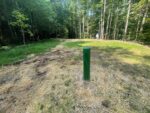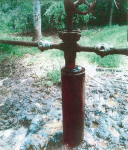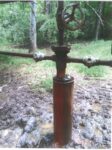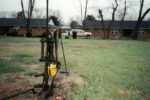- Like
- Digg
- Del
- Tumblr
- VKontakte
- Buffer
- Love This
- Odnoklassniki
- Meneame
- Blogger
- Amazon
- Yahoo Mail
- Gmail
- AOL
- Newsvine
- HackerNews
- Evernote
- MySpace
- Mail.ru
- Viadeo
- Line
- Comments
- Yummly
- SMS
- Viber
- Telegram
- Subscribe
- Skype
- Facebook Messenger
- Kakao
- LiveJournal
- Yammer
- Edgar
- Fintel
- Mix
- Instapaper
- Copy Link
Fate of Anti-Nuisance Suit Bill Uncertain
Thanks to everyone who has responded to our calls for action — your calls and emails to legislators can and do make a difference. As we head into the final week of the legislative session, we’re relieved that several bills to benefit the oil and gas industry have died.
Different versions of a forced leasing bill (HB 4639 & SB 646) that would allow drillers to lease jointly owned or heirship mineral tracts if a simple majority of owners agreed to sign, failed to get out of committee in time to be voted on by either the House or Senate ahead of last Wednesday’s deadline for bill’s to be out of the house of origin.
A bill (SB 596) that would have given pipeline companies planning the interstate pipeline projects the right to access private property for the purpose of surveying without getting landowner permission was voted down on the Senate floor.
And finally, SB 565, which would allow drillers to build well pads and access roads on a surface owners land without getting a we’ll work permit, appears to be dead after the Department of Environmental Protection reached an agreement with industry lobbyists on a plan to better schedule and coordinate the review of drilling permits.
That leaves, the most concerning, SB 508, a bill that undermines our property rights by taking away the ability to file nuisance suits, still in play. While the fate of bill remains uncertain, we are hearing from legislators that the bill may not be taken up due to concerns expressed by House leadership that the bill is too broadly written.
House Speaker Tim Armstead publicly voiced his concerns about the bill Friday on Talkline with Hoppy Kercheval. Armstead said that while he thought the bill was well intentioned, it was too broadly written and one-sided. With only a week left in the session, Armstead said it would be difficult to sort through all of the issues and concerns raised about the bill. He said if the House moves forward with the legislation they want it to be something that protects property rights.
While it would be nice to declare SB 508 dead based on this news, we can’t sit back and rest on our laurels on this one. SB 508 is simply too heinous.
If you haven’t already, please contact House Judiciary Committee members and your delegates about this terrible bill that would leave us with no legal recourse to hold irresponsible neighbors whose activities devalue and interfere with our enjoyment and use of our property accountable. Click here to see last week’s update for more details on SB 508 and who to contact.
In addition, we also encourage you to take action on SB 601, a bill that would make it easier to site and build landfills for drilling waste. Unfortunately, in many respects our only options for dealing with this characteristically hazardous waste are bad and less bad. From a surface owner’s perspective, disposing of drilling waste in landfills is an improvement over on-site burial, but our municipal landfills were never designed for nor intended to accept this type of waste.
We have said before that we think the industry should be responsible for building its own specialized landfills to deal with the waste it generates, rather than filling up our municipal landfills. However, these landfills need to be responsibly sited and all of the entities that currently play a role in the permiting process need to remain involved. We can’t make it easier for the industry to build unnecessary dumps in our communities and many of our members have expressed concern about SB 601. Keep reading for more details.
Bill Would Make It Easier to Build Drilling Waste Landfills, Hurt Local Solid Waste Authorities
A bill that would make it easier to site and build landfills for drilling waste will be voted on by the House of Delegates later this week. SB 601 has been changed dramatically more than once since it was introduced. It started as a bill that would have made it easier to issue permits for solid waste facilities that accept only drilling waste. This would have been done by taking away the local control county and regional solid waste authorities currently have to approve siting of such facilities and eliminating the requirement that these facilities obtain a certificate of need from the WV Public Service Commission (PSC). The WV Department of Environmental Protection (DEP) would have been the sole regulatory agency for such facilities, but their role would have been limited.
Last Sunday, SB 601 was hastily rewritten in the Senate Judiciary Committee and turned into a purported recycling bill. The amended version of the bill contained no reference to or mention of oil and gas solid waste. Instead the bill removed two types of “recycling” facilities, “materials recovery facilities” and “mixed waste processing facilities,” from the PSC’s jurisdiction. Under the amended version of the bill, these “recycling” facilities would still have to get siting approval from local or regional solid waste authorities, but would not be required to get a certificate of need.
Unfortunately, despite SB 601’s transformation into a “recycling” bill, there were concerns that solid waste authorities had that we did not know about until the bill had already passed the Senate. To make matters worse, after the bill was reported to the House it appeared almost immediately on the House Judiciary Committee agenda, where the oil and gas solid waste provisions were amended back in.
It is not as bad as the original introduced version. Oil and gas waste, materials waste recovery facilities and mixed waste processing facilities would still have to get siting plan approval from the local solid waste authority, but would not be required to get a certificate of need from the PSC and would be completely removed from PSC jurisdiction.
So what’s wrong with SB 601?
1) It removes an important step in the permitting process for oil and gas solid waste facilities. More specifically it would be easier to site and build such facilities because they would no longer be required to get a certificate of need from the WV Public Service Commission and would be completely removed from the PSC’s jurisdiction. The WV Department of Environmental Protection would still be involved in the environmental aspects of the permitting process, but the DEP has no authority to limit the number of facilities that could be built or where they could be sited relative to other facilities accepting the same type of waste.
2) Local and regional solid waste authorities have concerns that SB 601 will put them at a competitive disadvantage with the “materials recovery facilities” and “mixed waste processing facilities” that are being deregulated by the bill, jeopardizing the public funding solid waste authorities have invested in their facilities.
There will most likely be an amendment on the floor to take out the oil and gas provisions, but we have to make phones ring and get emails in to delegates opposing this. So please call or email your delegates and tell them that SB 601 is bad because the Public Service Commission’s oversight is important, and prevents unneeded waste dumps from being built. However, the oil and gas provisions are not the only concern. SB 601 also puts our local and regional solid waste authorities at a competitive disadvantage with the so-called “recycling” facilities that are being deregulated, jeopardizing the public investment in these facilities.
Your senators need to hear a similar message. They may not be aware that the bill has changed, and some were likely unaware of the problems with the version they passed.











